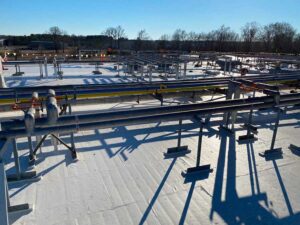
Commercial flat roofing is a popular choice for businesses in Starkville, offering numerous benefits and advantages. Understanding the basics of commercial flat roofing is essential for property owners and managers who are considering this type of roof for their buildings. In this article, we will explore the key features of flat roofing, the materials used, the benefits it offers, as well as the importance of maintenance and care. We will also provide valuable insights into choosing the right roofing contractor and debunk some common misconceptions about flat roofing.
Understanding the Basics of Commercial Flat Roofing
Commercial flat roofing is characterized by its low-slope or completely flat design. Unlike traditional pitched roofs, which have a steep slope, flat roofs have a near-horizontal surface. This design offers a distinct set of advantages, making it suitable for various commercial applications.
But what makes flat roofing truly stand out? Let’s dive deeper into the key features that make it a popular choice for commercial buildings.
Key Features of Flat Roofing
One of the main features of flat roofing is its simplicity. The lack of complex slopes and angles makes installation and maintenance easier compared to pitched roofs. This not only saves time but also reduces the overall cost of the roofing project. Additionally, the low slope allows for efficient water runoff when properly designed and installed, preventing water pooling and potential leaks.
Another advantage of flat roofing is its versatility. The flat surface provides ample space for the installation of HVAC units, solar panels, and other equipment. This makes it an ideal choice for commercial buildings that require additional space for utility installations.
Materials Used in Flat Roofing
Flat roofs can be constructed with various materials, each with its own set of advantages and considerations. Let’s take a closer look at some of the most common materials used in commercial flat roofing:
- Modified bitumen: This multi-layered roofing system offers excellent durability and flexibility, ensuring resistance against temperature fluctuations and UV rays. It is also known for its ease of installation and repair, making it a popular choice among contractors.
- TPO (thermoplastic olefin): TPO membranes are highly reflective, which helps reduce energy consumption and lower cooling costs. They are also resistant to chemical and environmental damage, making them a sustainable and long-lasting option.
- EPDM (ethylene propylene diene terpolymer): EPDM is a rubber-like material that provides excellent weather resistance and longevity. It has a proven track record of withstanding extreme weather conditions, including hail, high winds, and even fire.
- PVC (polyvinyl chloride): PVC membranes are known for their exceptional durability and resistance to fire, chemicals, and punctures. They also have great flexibility, allowing for easy installation and maintenance. Additionally, PVC roofs are highly reflective, helping to reduce energy costs.
When choosing the right material for your flat roof, it’s important to consider factors such as climate, building usage, and budget. Consulting with a professional roofing contractor can help you make an informed decision that meets your specific needs.
So, whether you’re considering a flat roof for a commercial building or simply want to learn more about this roofing option, understanding the basics can help you make an informed decision. With its simplicity, versatility, and a wide range of materials to choose from, flat roofing continues to be a popular choice for commercial applications.
Benefits of Commercial Flat Roofing in Starkville
When it comes to commercial buildings in Starkville, flat roofing offers several key benefits that make it an attractive choice for property owners and managers.
Durability and Longevity
Flat roofing systems are designed to be durable and long-lasting when properly installed and maintained. With regular inspections and appropriate care, a flat roof can protect a building for decades, ensuring peace of mind for the property owner.
Cost-Effectiveness
Flat roofs are generally more cost-effective compared to pitched roofs. The simpler design and easy installation process reduce labor and material costs. Additionally, the low-maintenance nature of flat roofs saves money on repairs and upkeep in the long run.
Space Utilization
Unlike pitched roofs, which create usable space only in the attic, flat roofs provide additional usable space. This extra space can be utilized for various purposes, such as rooftop gardens, solar panel installations, or outdoor recreational areas.
Maintenance and Care for Flat Roofs
Maintaining a flat roof is crucial to ensure its longevity and prevent costly damages. Regular inspection and cleaning are essential tasks that should be performed:
Regular Inspection and Cleaning
Property owners should schedule regular inspections by professional roofing contractors to identify and address any potential issues. This includes checking for cracks, leaks, or signs of damage in the roofing materials and components. A yearly or bi-yearly cleaning of debris, leaves, and other obstructions helps prevent water pooling and promotes effective water runoff.
Dealing with Weather Damage
In Starkville, extreme weather conditions such as high winds, heavy rain, and hail are common. Flat roofs need to be able to withstand these conditions. Regular maintenance can help identify and address small issues before they develop into major problems. Additionally, property owners should ensure their roofs are properly insulated and that drainage systems are functioning well to prevent weather-related damage.
Choosing the Right Roofing Contractor in Starkville
When it comes to installing or repairing a commercial flat roof in Starkville, selecting the right roofing contractor is crucial. Consider the following factors before making a decision:
Factors to Consider
- Experience and Expertise: Choose a contractor with extensive experience in commercial flat roofing. Look for certifications and references to ensure their expertise.
- Licenses and Insurance: Verify that the contractor holds the necessary licenses and insurance to protect both parties in case of accidents or damages.
- Portfolio and Past Projects: Review the contractor’s portfolio and past projects to assess the quality of their work and determine if they can meet your specific requirements.
- Cost and Estimates: Obtain detailed cost estimates from different contractors and compare them. Price should not be the sole determining factor, as quality and reputation are equally important.
Questions to Ask Your Contractor
When contacting potential roofing contractors, ask them the following questions to gather more information and ensure a successful partnership:
- How long have you been in business?
- What types of flat roofing systems do you specialize in?
- Can you provide references from past clients?
- What is your approach to maintenance and repairs?
- Do you offer any warranties or guarantees?
Common Misconceptions About Flat Roofing
Despite the numerous advantages of commercial flat roofing, misconceptions and myths persist. Let’s debunk some of the most common ones:
Debunking Flat Roof Myths
Myth #1: Flat roofs are prone to leaks and water damage. Reality: Flat roofs can be designed and installed with proper waterproofing measures, ensuring they are as leak-resistant as pitched roofs.
Myth #2: Flat roofs are less durable than pitched roofs. Reality: With the right materials, professional installation, and regular maintenance, flat roofs can offer excellent durability and longevity.
Myth #3: Flat roofs are more expensive to maintain. Reality: Flat roofs are generally easier and cheaper to maintain than pitched roofs. With proper care, they can provide cost savings in the long run.
Myth #4: Flat roofs cannot withstand extreme weather conditions. Reality: Flat roofing systems can be designed to withstand harsh weather conditions, making them suitable for regions with varying climates.
By understanding the basics of commercial flat roofing, its benefits, maintenance requirements, and how to choose the right contractor, property owners in Starkville can make informed decisions regarding their roofing needs. Debunking common misconceptions ensures that businesses can fully capitalize on the advantages that flat roofing offers. Whether you are looking to install a new roof or maintain an existing one, investing in commercial flat roofing can provide you with a durable, cost-effective, and space-efficient solution for your business premises.
Ready to ensure your Starkville commercial property is equipped with a top-tier flat roofing system? Look no further than Commercial Roofing Rana, your trusted partner for exceptional roofing services across the Mid-South. With our Platinum-level installation of Duro-Last roofing systems, you’ll receive the ultimate protection against water damage, tailored to fit your building perfectly. Our commitment to quality has served industrial complexes, commercial stores, municipal buildings, and more since 1983. Don’t wait for the next rainstorm to test your defenses. Schedule Now and join the ranks of satisfied business owners who trust in our expertise and superior roofing solutions.
